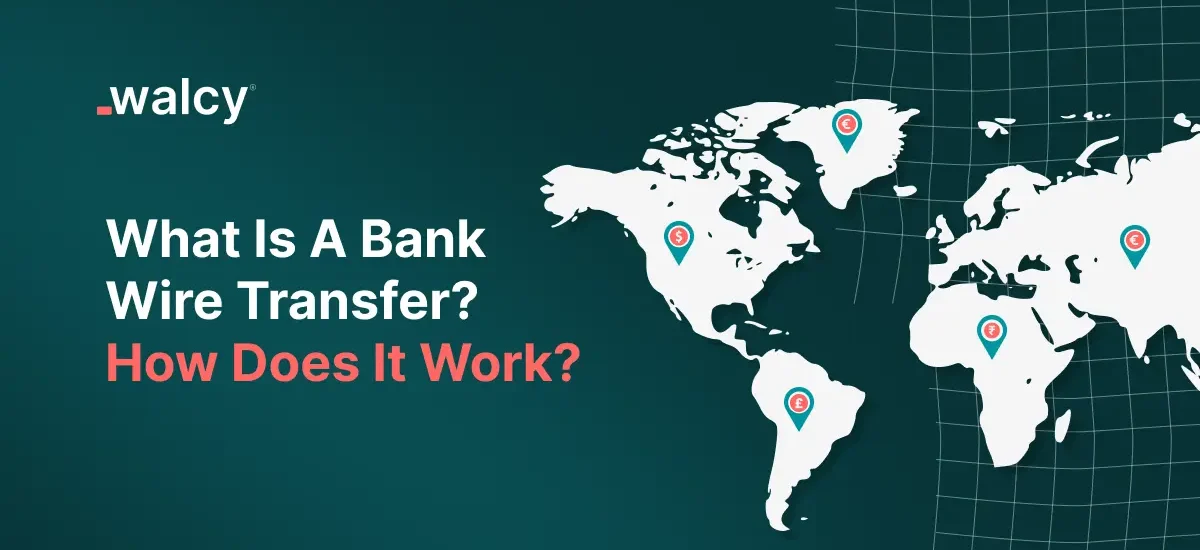Bank wire transfer may be defined as the electronic transfer of funds from one account to another.
It is a common mode of money transfer applied at the domestic and international levels to guarantee a safe and considerably fast way to transfer funds from one account to another.
Wire transfers are fundamental tools of transactions in business and personal financing and hence form the backbone of financial systems globally.
Understanding Wire Transfers
Wire transfer is all about how money is electronically moved from one financial institution to another.
It may be used to make bill payments, send money to friends or relatives, or even transfer huge sums in business deals.
Unlike other modes of payment, such as checks or online transfers, wire transfers are direct and hence usually available within a few days.
This direct nature makes wire transfers the surest way to conduct high-value transactions, guaranteeing the recipient receives the funds expediently and safely.
Wire transfers are conducted over secure, standardized systems, like the Society for Worldwide Interbank Financial Telecommunication.
SWIFT is a network for international transfers and the Federal Reserve Wire Network- Fedwire for domestic transfers in the United States.
These networks provide a safe and reliable conduit for money transfers, reducing fraud risks and ensuring that transactions are appropriately and, in most cases, efficiently processed.
Several banks, like Walcy Bank, specialize in services designed to facilitate the process, with competitive exchange rates, low fees, and effective processing of international payments.
How Does a Bank Wire Transfer Work?
Initiation:
The transfer is started by the sender to avail his or her banking details of the receiver and this will encompass the receiver’s name and the account number in cases where the transfer is from one country to another then the bank code of the receiver’s bank is the SWIFT or IBAN code.
Other risks that can be asked for include the receiver’s address and the type of transaction for regulatory requirements.
Verification:
Verification is done to guarantee the correctness of the details provided as well as the sufficiency of the amount in the sender’s account as they receive the details.
This also verifies details concerning the bank of the receiver as well as compliance with the various anti-fraud measures and regulations on transfer requests.
Transfer:
The institution from the sender sends a credit to the payment system for transfer of money such as SWIFT for the international transfer of money and Fed wire for the transfer of money in the United States of America.
The money is forwarded through several intermediary banks if the need arises; this usually applies in cross-border transfers that can have several institutions to cover before reaching the intended recipients.
Receipt:
These funds are paid into the account of the beneficiary by the beneficiary’s bank.
This is the last process in fund transfer and refers to the process by which the recipient is informed about the transfer of funds and is usually made accessible for immediate or same business day utilization depending on the involved banks and currency conversion.
Types of Wire Transfers
- Domestic Wire Transfers:
These take place within the same country and involve a short period; they are less expensive compared to international wire transfers.
Domestic transfers may be completed on the same day, often in hours, depending on the bank and what time the transfer is initiated.
While the fees for domestic wire transfers are comparably very low, they are always utilized to close on a home purchase, pay off large invoices, or even for personal transfers between banks.
- International Wire Transfers:
These involve sending money across borders and take much longer with higher fees. International transfers are also subject to foreign exchange rates and may take a few days, for one is dealing with more than one financial institution, along with regulatory checks.
Right from their complicated nature of execution, international transfers can also involve intermediary banks, adding to the processing time as well as costs.
International wire transfers are used for cross-border business transactions, sending remittances to family members, or purchasing property abroad.
These transfers can be made much easier by the competitive exchange rate and lower fees that services such as Walcy Bank are in a position to offer.
Advantages and Disadvantages of Wire Transfers
Advantages
-
- Speed:
This method entails the use of bank wire transfers, and is considered among the fastest when it comes to money transfer especially where large amounts of money are involved. Such transactions within the country can be done within a few hours while for transactions between countries, it may take a few days. This is very important for real-time and very sensitive or very large value transaction requirements.
- Speed:
-
- Security:
The use of wire transfers comes in as highly secure since these involve use of banking facilities. Large banking corporations leverage secure platforms such as SWIFT or Fedwire because they eradicate several risks of fraudulent activities as well as mistakes.
- Security:
-
- Reliability:
The wire transfers are secure and using this method majority of the amount is available within 2 to 3 business days. Compared to the other tactics, the straight transfer eliminates the probability of getting delayed or intentionally erroneous deliveries to the recipients.
- Reliability:
Disadvantages
-
- Cost:
Payments through the wire are comparatively costly and this is true especially when one is sending money internationally. It may be the sending fee, receiving fee, and currency conversion rate charges. This cost may accumulate depending on the nature, frequency, and value of the transfer done, therefore the users need to check on the costs offered by different institutions or services.
- Cost:
-
- Irreversibility:
A significant thing that should be understood concerning wire transfers is that once a wire transfer has been done, it cannot be undone. This irreversibility can become an issue in cases where there has been fraud or mistakes. Hence, all the particulars passing through this channel should be thoroughly checked before proceeding with a transfer to minimize errors.
- Irreversibility:
-
- Bank Dependency:
This relies on the banking time and banking policies, sometimes it may take time before the transfer occurs. Furthermore, sometimes, the international transfer is processed via intermediary banks and this increases the time taken and the overall charges to carry out the transfer.
- Bank Dependency:
Conclusion
Bank wire transfers are one of the most reliable and secure modes of money transfer, whether within the country or abroad.
Although it does bear some costs and delays, its speed and security make it quite common for transferring funds, especially in large amounts.
The direct nature of wire transfers ensures that funds are normally available within just a few days, reducing the potential risk of delay or error compared to other forms of payment.
Bank wire transfers provide an effective and secure way for any business or individual to transfer money.
It is a sure way for money to get to its destination quickly, whether one is making urgent payments, large transactions, or regular cross-border transfers.
Having the right financial institution and understanding the involved costs and processes will help in using wire transfers to their maximum potential while reducing the drawbacks.
FAQs
What is an international bank wire transfer?
International bank wire transfer is the mechanism for transferring money from one country to another through a secure electronic system such as SWIFT.
How much are international wire transfer fees?
Wire transfer fees will always be different depending on the bank one conducts business with and the countries involved. They generally include a sending fee, a receiving fee, and currency conversion fees. It is possible to get competitive rates by checking with banks like Walcy.
What is the cheapest way to wire money internationally?
The cheapest way to wire money internationally may vary, but you would do it cost-effectively through services like Walcy for competitive FX rates and low fees. Other options that might be considered are online money transfer services, which have promotions on reduced fees.
How can I send money abroad?
You can wire transfer money through a bank, online money transfer services, or even via Walcy, a platform designed to make international payments easy. What is most important here is the knowledge of how to compare fees and exchange rates in order to find a deal that best suits your needs.
Are there no fee wire transfer options?
Some banks and financial institutions offer promotions for no-fee wire transfers, but these are rare. Checking with services like Walcy for competitive rates can help minimize costs.
What is the fastest way to wire money internationally?
The fastest way to wire money internationally is through established banking systems using services like SWIFT. Banks like Walcy can offer expedited services to speed up the process. Online services may also provide rapid transfers, but it’s essential to verify their security and reliability.
What are wire transfer fees?
Wire transfer fees are charges incurred for sending money electronically. These can include a sender fee, a receiver fee, and additional charges for currency conversion. Comparing fees across different banks and services can help you find the most cost-effective option.
What is a bank wire payment?
A bank wire payment is another term for a wire transfer, where funds are electronically transferred from one bank account to another. This method is often used for large or urgent payments due to its speed and reliability.
How does the wire transfer system work?
The wire transfer system involves banks that form a networking system to enable electronic fund transfers using secure systems for payments, such as SWIFT for international and Fedwire for the domestic United States. It is then ensured by each bank involved in the transfer that the money is transferred securely and accurately.
Do follow us on Facebook and LinkedIn, to stay connected with us.



